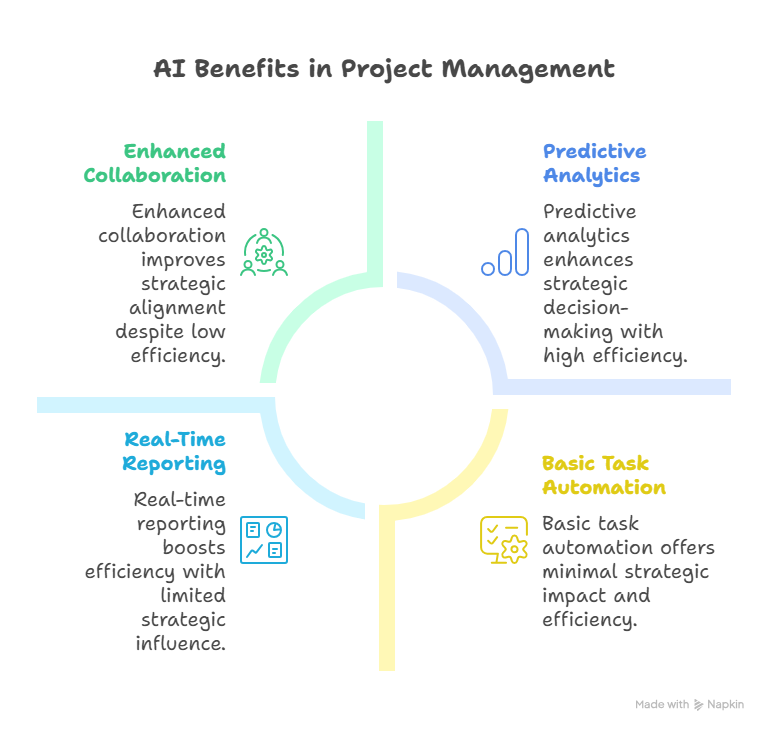Project management (PM) is undergoing a fundamental transformation. What once required countless hours of manual planning, tracking, and coordination can now be streamlined through artificial intelligence in project management. From automated task assignments to predictive risk analysis, AI-powered project management is changing how teams deliver successful projects.
This article explores the benefits of AI in project management and the practical use cases that are delivering results for teams today. Whether you're considering AI project management tools for the first time or looking to optimize your current setup, you'll discover how AI workflow automation can elevate your project outcomes.
AI-powered project management combines traditional project management methodologies with artificial intelligence. Unlike conventional project management tools that simply organize information, AI project management tools can analyze data, identify patterns, and make intelligent recommendations.
These systems learn from historical project data to forecast outcomes, automatically adjust schedules based on team capacity, and flag potential risks before they become critical issues.
The difference is significant: traditional tools require project managers to manually input and interpret data, while artificial intelligence in project management transforms that data into actionable insights automatically.

The benefits of AI in project management includes:
AI workflow automation eliminates the repetitive tasks that drain project manager productivity. Status updates, progress reports, and meeting notes can be generated automatically. Approval workflows route themselves based on predefined criteria, and routine communications happen without manual intervention.
Consider a typical project manager who spends 20-30% of their time on administrative tasks. With project management automation, that time gets redirected toward strategic planning, stakeholder relationships, and problem-solving. The efficiency gains compound across teams; what takes a team of ten people hours to coordinate manually can happen in lesser hour with intelligent automation.
AI task automation revolutionizes how work gets assigned and prioritized. Instead of project managers manually reviewing team capacity and skills to assign tasks, AI project management tools analyze team member expertise, current workload, and availability to make optimal assignments automatically.
These systems continuously monitor task dependencies and deadlines, automatically reprioritizing work when circumstances change. If a critical task falls behind, AI can suggest workload rebalancing or flag the need for additional resources before the delay impacts downstream activities.
Perhaps the most powerful capability of AI in project management is its ability to predict problems before they occur. By analyzing patterns from thousands of past projects, AI systems identify early warning signs of delays, budget overruns, or quality issues.
These predictive models consider dozens of variables simultaneously: team velocity, task complexity, historical performance, external dependencies, and more. When the system detects a high probability of schedule slippage, it alerts the project manager with specific recommendations for mitigation. This proactive approach to risk management dramatically reduces project failures.
Resource constraints cause more project delays than any other factor. AI-powered project management addresses this by providing real-time visibility into resource utilization across all projects. The technology identifies overallocated team members, suggests optimal resource distribution, and even predicts future resource needs based on project pipelines.
Advanced systems also identify skill gaps within teams and recommend training or hiring priorities. By optimizing resource allocation, organizations can take on more projects without expanding headcount or reduce burnout by preventing team member overload.
Traditional project reporting creates a time lag between what's happening and what stakeholders know. AI project management tools provide real-time dashboards that update automatically as work progresses. Project managers and stakeholders see current status, health indicators, and trend analysis without waiting for manual reports.
These insights go beyond simple progress tracking. AI systems analyze velocity trends, identify bottlenecks, and surface anomalies that deserve attention. The result is faster decision-making based on current, accurate information rather than outdated reports.
AI workflow automation extends to team communication. Meeting transcripts automatically generate action items, which get assigned and tracked without manual data entry. Intelligent notification systems ensure team members receive relevant updates without information overload.
For distributed teams, AI helps bridge time zones by summarizing discussions and decisions, ensuring everyone stays aligned regardless of when they're working. This reduces the coordination overhead that typically increases with team size and distribution.
AI algorithms excel at the complex calculations required for optimal project scheduling. They consider task dependencies, resource availability, task duration estimates, and priority levels to generate schedules that maximize efficiency while remaining realistic.
When project conditions change, a team member takes unexpected leave, a vendor delivers late, or scope expands. AI project management tools automatically recalculate schedules and present options for getting back on track. This dynamic scheduling capability eliminates hours of manual timeline adjustments.
Skills-based task assignment represents one of the most impactful applications of AI in project management. The system maintains detailed profiles of team member skills, experience levels, and performance history. When new tasks arise, AI matches them to the best-suited team members while balancing workload distribution.
This capability becomes especially valuable for organizations managing multiple concurrent projects. AI can optimize resource allocation across the entire portfolio, ensuring high-priority projects get the talent they need while preventing team member burnout.
AI-powered risk management monitors projects continuously for warning signs. The system compares current project metrics against patterns associated with past project failures, calculating risk scores for various negative outcomes.
When risk levels exceed acceptable thresholds, the system not only alerts project managers but suggests specific mitigation strategies based on what worked in similar situations. This transforms risk management from a periodic checklist exercise into an ongoing, data-driven process.
Project management automation extends to financial oversight. AI systems track spending patterns, compare them against budget allocations, and forecast final costs based on current burn rates. Early detection of budget variances allows for corrective action before overspending becomes significant.
Advanced systems also identify spending anomalies that might indicate errors or inefficiencies. By flagging unusual expenses for review, AI helps maintain financial discipline across projects.
Keeping stakeholders informed without overwhelming them requires careful judgment about what to communicate and when. AI project management tools generate personalized stakeholder updates automatically, tailoring content based on each stakeholder's role and information needs.
Sentiment analysis capabilities can even gauge team morale from communication patterns, alerting project managers to potential engagement issues before they impact performance.
Project documentation often falls behind because team members lack time to maintain it. AI task automation addresses this by auto-generating documentation from project activities, meeting discussions, and decisions.
Intelligent search capabilities make finding information across projects effortless. Instead of searching through folders and files, team members ask questions in natural language and receive relevant information from across the project knowledge base.
Full-featured AI project management tools like:
- Monday.com
- Asana
- ClickUp
All integrate automation throughout the project lifecycle. These platforms offer AI-powered task assignment, automated status reporting, predictive analytics, and intelligent resource management within a unified interface.
These solutions work best for organizations wanting to consolidate their project management stack into a single platform with extensive AI capabilities.
Specialized tools like Motion and Reclaim.ai focus specifically on intelligent task management and scheduling. These AI project management tools excel at automatic calendar optimization, smart task prioritization, and adaptive scheduling that adjusts to your actual working patterns.
These tools integrate with existing calendars and project management systems, adding AI task automation capabilities without requiring a complete platform migration. They're ideal for individuals and small teams looking to optimize personal productivity first.
Tools like:
- Skynet Agent Studio
- Zapier
- Make
All enable sophisticated project management automation by connecting different applications. While not project management platforms themselves, they allow teams to build custom AI workflow automation that fits their specific processes.
These solutions shine when organizations need to orchestrate automation across multiple systems connecting project management tools with CRMs, communication platforms, and other business services.
Before adopting AI project management tools, identify specific pain points in your current processes. Are status updates consuming excessive time? Do projects frequently encounter unexpected delays? Is resource allocation creating bottlenecks?
Document these challenges clearly and quantify their impact when possible. This assessment becomes your baseline for measuring AI implementation success and helps prioritize which AI capabilities will deliver the greatest value.
Not all AI in project management solutions address the same needs. Evaluate tools based on how well they solve your specific challenges. Consider factors like integration capabilities with your existing tech stack, ease of use for your team, scalability, and total cost of ownership.
Most vendors offer trial periods or demonstrations. Use these opportunities to test tools with real project data before committing. Involve team members who will use the tools daily in the evaluation process to ensure buy-in.
Successful artificial intelligence in project management implementation requires seamless data flow between systems. Evaluate API capabilities, pre-built integrations, and data migration tools. Plan for how project data will move into the new system and how the AI tool will connect with communication platforms, file storage, and other critical systems.
Consider starting with a pilot project rather than migrating everything at once. This approach allows you to identify integration challenges on a smaller scale before full deployment.
Even the best AI project management tools deliver no value if teams don't adopt them. Invest in comprehensive training that covers not just how to use features but why AI makes their work better. Address concerns about AI replacing human judgment by emphasizing how project management automation handles routine tasks so people can focus on creative problem-solving.
Create internal champions who master the tools first and can support their peers during the transition. Celebrate early wins to build momentum and demonstrate value.
Define clear metrics for evaluating your AI implementation. Track time savings on administrative tasks, improvements in project delivery rates, budget variance reduction, and team satisfaction. Compare these metrics against your baseline assessment.
Remember that full value realization from AI in project management often takes several months as the system learns from your data and teams adapt their workflows. Plan for regular reviews and optimization rather than expecting immediate transformation.
AI in project management represents more than a technological upgrade. it's a fundamental shift in how projects get delivered. From AI task automation that eliminates administrative burden to predictive analytics that prevent failures before they occur, artificial intelligence in project management empowers teams to achieve more with less stress and greater confidence.
The organizations seeing the greatest benefits aren't waiting for AI to mature further; they're implementing AI project management tools now and learning how to maximize their value. Whether you start with AI workflow automation to reclaim time lost to routine tasks or dive into comprehensive AI-powered project management platforms, the key is to begin.
The future of project management is here, and it's powered by artificial intelligence.
The primary benefits include significant time savings through project management automation, improved project success rates through predictive analytics, better resource utilization, and enhanced decision-making based on data-driven insights.
For small teams, user-friendly options like Monday.com's AI features, Asana Intelligence, or specialized tools like Motion work well. These provide powerful AI capabilities without overwhelming complexity. Look for tools with flexible pricing that scale with team size.
AI workflow automation eliminates time-consuming manual tasks like status reporting, schedule updates, and task assignments. This reduces administrative overhead while improving accuracy. Teams can focus energy on actual project work rather than project coordination.
No. AI in project management augments project manager capabilities rather than replacing them. AI handles data analysis, routine coordination, and pattern recognition, while project managers focus on strategic planning, stakeholder relationships, problem-solving, and the human aspects of team leadership.
Pricing varies significantly based on features and team size. Many vendors offer tiered pricing with AI features in premium tiers.
AI can identify patterns associated with project failure and calculate probability of various negative outcomes. While not perfectly predictive, these systems provide early warnings that allow project managers to implement corrective actions before issues become critical, significantly reducing failure rates.
